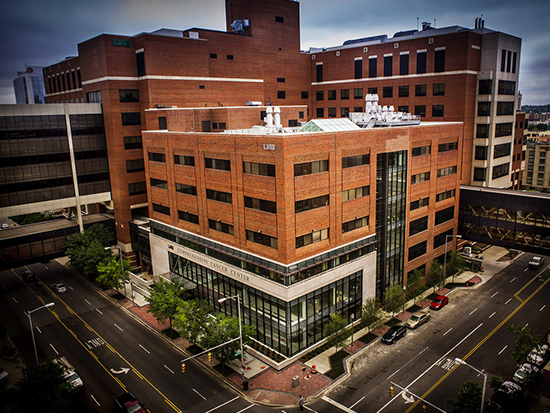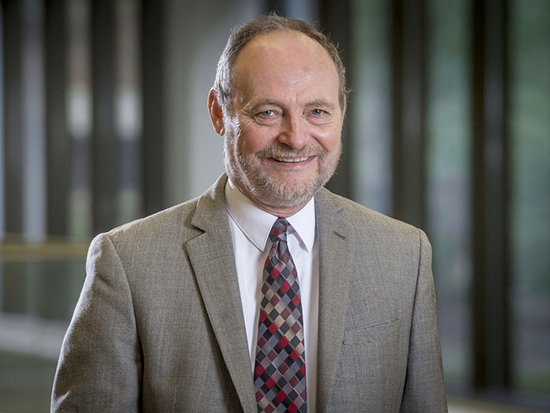 The gift will help recruit new faculty, build research infrastructure and provide an economic boost for BirminghamThe economic impact of a $30 million gift from O’Neal Industries and its shareholders to the O’Neal Comprehensive Cancer Center at the University of Alabama at Birmingham may be felt four ways, says Michael Birrer, M.D., Ph.D., center director. The gift will help:
The gift will help recruit new faculty, build research infrastructure and provide an economic boost for BirminghamThe economic impact of a $30 million gift from O’Neal Industries and its shareholders to the O’Neal Comprehensive Cancer Center at the University of Alabama at Birmingham may be felt four ways, says Michael Birrer, M.D., Ph.D., center director. The gift will help:
- Recruit additional talented cancer scientists and clinicians to UAB, along with the hefty federal grants they garner.
- Expand the number of cancer treatment clinical trials at UAB, an increase that will help patients throughout Alabama and the Southeast.
- Plant the seed for a UAB/Biotech collaboration that can grow into a future Birmingham biotechnology park, much as eastern Cambridge, Massachusetts, has transformed in the past three decades from an aged manufacturing area to a biotechnology boomtown.
- Create a distinctive brand around the center for UAB, Alabama and the Deep South.
All of these can boost UAB’s already considerable impact as the key economic engine for Greater Birmingham.
The $30 million gift will go into an endowment — creating a yearly flexible fund of about $1.5 million that leadership of the cancer center and UAB School of Medicine can use in ways that best leverage further advancement of the cancer center.
“For example,” Birrer said, “let’s say we want to apply for a SPORE grant (Specialized Programs of Research Excellence), the big grants from the National Cancer Institute that focus on a specific organ site or group of cancers. However, in order to do this, we have to hire what I would call a pre-award grants administrator.”
This administrator would be the initial step to help prime the pump toward winning a major grant with multi-year funding.
A similar leveraging opportunity is found in expanding clinical trials at UAB, which will offer hope to cancer patients and bring in dollars, Birrer says. Endowment funds could help hire one or two clinical trials experts, as well as clinical research coordinators, clinical research associates and research nurses. “These kinds of hires are actually not easy,” Birrer said.
Clinical trials that patients want
Expansion of clinical trials — with the goal of increasing the annual accrual of cancer patients from the current 500 new patients a year to 1,500 new patients — will be felt across the Southeast.
“Clinical trials are effectively experiments where you are testing new drugs versus the standard care,” Birrer said. “What the patient would normally get is compared to something new, and this is how the field moves forward. It’s how we discover new effective therapies.”
The center offers a mix of what Birrer calls “different flavors” of trials — including national multi-center trials and drug company-sponsored trials.
Birrer especially favors a third type — early drug development trials — for two reasons that can benefit Birmingham and Alabama.
“The first reason is that’s what patients want,” Birrer said. “Drug development has changed radically over the past 10 to 15 years. It used to be a gamble, in the sense that most drugs fail, and it was a bit of a random chance. Now, with all the molecular biology that we have and all the preclinical testing, the chance that a drug is going to work is much higher, and patients know that.”
“They come here asking for these drugs.”
 Cancer center director Michael Birrer, M.D., Ph.D.Best route to economic development
Cancer center director Michael Birrer, M.D., Ph.D.Best route to economic development
“The other reason,” Birrer said, “and one that is very important from my perspective, is that the companies involved in early drug development are not only Big Pharma but also Biotech,” Birrer said, using the nickname for the biotechnology industry, which has a mix of many smaller players. “I think we can create a UAB/Biotech collaboration here in Birmingham that will help our patients and also drive innovation and revenue for the city.”
“UAB has some high-profile programs like neuroscience and precision medicine,” he said. “But the most branded program at UAB — and the one that has clearest route to economic development in Birmingham — is cancer, unfortunately because it is a common disease and patients need treatments.”
Birrer says he has already found one receptive listener for the concept of a future Birmingham biotechnology park — Birmingham Mayor Randall Woodfin. “The economic impact can be huge,” Birrer said. With the now exploding Biotech industry, I think there is a real opportunity.”
Alabama has a comparative advantage, he says, since labor costs for biotechnology companies in Cambridge are probably twice what they would be in Birmingham. “UAB has 20,000 undergraduates who are well-trained, we have the patient volume, and we have expertise in clinical trials.”
Craft O’Neal, chairman and CEO of O’Neal Industries, says he recognizes the economic impact the $30 million O’Neal gift will make, and suggests the gift may be an impetus to get other philanthropic snowballs rolling.
“My understanding is, for every dollar invested in the cancer center, there is at least a $14 return,” O’Neal said. “That’s pretty spectacular, and I love the fact our gift will help in that regard. It makes me proud, and I’d love to see others come forward with large gifts as well.”
The gift and naming will be formally considered for acceptance by the University of Alabama System Board of Trustees at its February meeting. For more information on the gift, go to www.uab.edu/news.